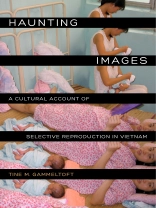Based on years of careful ethnographic fieldwork in Hanoi,
Haunting Images offers a frank and compassionate account of the moral quandaries that accompany innovations in biomedical technology. At the center of the book are case studies of thirty pregnant women whose fetuses were labeled ‚abnormal‘ after an ultrasound examination. By following these women and their relatives through painful processes of reproductive decision making, Tine M. Gammeltoft offers intimate ethnographic insights into everyday life in contemporary Vietnam and a sophisticated theoretical exploration of how subjectivities are forged in the face of moral assessments and demands.
Across the globe, ultrasonography and other technologies for prenatal screening offer prospective parents new information and present them with agonizing decisions never faced in the past. For anthropologists, this diagnostic capability raises important questions about individuality and collectivity, responsibility and choice. Arguing for more sustained anthropological attention to human quests for belonging,
Haunting Images addresses existential questions of love and loss that concern us all.
Inhaltsverzeichnis
List of Illustrations
Acknowledgments
Prologue: Haunting Decisions
Introduction: Choice as Belonging
1. Sonographic Imaging and Selective Reproduction in Hanoi
2. A Collectivizing Biopolitics
3. Precarious Maternal Belonging
4. ‚Like a Loving Mother‘: Moral Engagements in Medical Worlds
5. ‚How Have We Lived?‘ Accounting for Reproductive Misfortune
6. Beyond Knowledge: Everyday Encounters with Disability
7. Questions of Conscience
Conclusion: Toward an Anthropology of Belonging
Appendix: Core Cases
Notes
Bibliography
Index
Über den Autor
Tine M. Gammeltoft is Professor of Anthropology, University of Copenhagen. She is on the Editorial Advisory Board for the journal Reproductive Health Matters.












